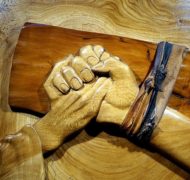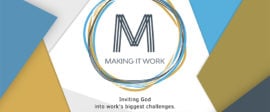Self-Reliance in Place of God’s Guidance (2 Chronicles 16-20)
Bible Commentary / Produced by TOW Project
Even as the kingdom’s strength declines, the kings remain convinced they are in control of their situation. Confident in their own abilities and trusting human advisors, they often fail to ask God’s guidance, usually with disastrous results.
In one case, King Ahab of Israel is about to go into battle. King Jehoshaphat of Judah reminds him, “Inquire first for the word of the Lord” (2 Chron. 18:4). Ahab consults his court prophets, but Jehoshaphat asks whether there is a genuine prophet of God available. Ahab replies, “There is still one other by whom we may inquire of the Lord, Micaiah son of Imlah; but I hate him, for he never prophesies anything favorable about me, but only disaster” (2 Chron. 18:7). Ahab doesn’t want advice from the Lord because it doesn’t align with his intentions. Eventually he does consult Michaiah, who indeed foretells disaster in the battle, for which Ahab has him imprisoned and starved (2 Chron. 18:18-27). Ahab proceeds into battle and is killed (2 Chron. 19:33-34).
Similarly, King Asa decides to form an alliance with the king of Aram instead of relying on God’s protection. Afterwards, he is challenged by a seer who tells him, “Because you relied on the king of Aram, and did not rely on the Lord your God, the army of the king of Aram has escaped you” (2 Chron. 16:7). Likewise, when Asa is stricken with a deadly foot disease, he does not seek the help from the Lord, but only from physicians (2 Chron. 16:12), leading to his early death.
Afterward King Jehoshaphat remembers to depend on God’s guidance. He reminds his judges, “Consider what you are doing, for you judge not on behalf of human beings but on the LORD’s behalf; he is with you in giving judgment. Now, let the fear of the LORD be upon you; take care what you do, for there is no perversion of justice with the LORD our God, or partiality, or taking of bribes.” (2 Chron. 19:6-7). Even so, when Jehoshaphat himself is facing a vast enemy army in battle, the prophet Jahaziel has to remind him, “Do not fear or be dismayed at this great multitude; for the battle is not yours but God’s.” (2 Chron. 20:15).
The kinds of work in these passages–military strategy, medicine, and the legal system—require human skill. Yet skill is not enough—insight from God is also required. Most kinds of modern work also require skill, and we may feel that our insight and training is greater than it was in ancient times. We may think we don’t think we need—or don’t want—God’s guidance, so we rely on our own strengths instead. God has gifted us with wisdom and insight, but God wants us to seek his face even we think we have all the abilities we need. In fact modern abilities and power make our need to rely on God greater, not less, because our ability to do harm in the absence of God’s guidance is greater now than ever. God gives us talents and abilities for a reason, and we need to use them in consultation with him.


















